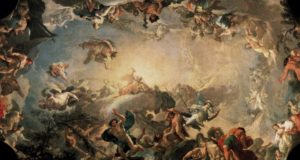A son of Theseus and Phaedra, and brother of Demophoon. (Diod. iv. 62.) Previous to the expedition of the Greeks against Troy, he and Diomedes were sent to demand the surrender of Helen (this message Homer ascribes to Menelaus and Odysseus, Il. xi. 139, &c.), but during his stay at Troy he won the affection of Laodice, daughter of Priam (Parthen. Nic. Erot. 16), and begot by her a son, Munitus, who was brought up by Aethra, the grandmother of Acamas. (Schol. ad Lycophr. 499, &c.) Virgil (Aen. ii. 262) mentions him among the Greeks concealed in the wooden horse at the taking of Troy.
On his return home, he was detained in Thrace by his love for Phyllis; but after leaving Thrace and arriving on the island of Cyprus, he was killed by a fall from his horse upon his own sword. (Schol. ad Lycophr. l. c.)
The promontory of Acamas in Cyprus, the town of Acamentium in Phrygia, and the Attic tribe Acamantis, derived their names from him. (Steph. Byz. s. v. Akamantion; Paus. i. 5. § 2.)
He was painted in the Lesche at Delphi by Polygnotus, and there was also a statue of him at Delphi. (Paus. x. 26. § 1, x. 10. § 1.)
A son of Antenor and Theano was one of the bravest Trojans. (Hom. Il. ii. 823, xii. 100.) He avenged the death of his brother, who had been killed by Ajax, by slaying Promachus the Boeotian. (Il. xiv. 476.) He himself was slain by Meriones. (Il. xvi. 342.)
A son of Eussorus was one of the leaders of the Thracians in the Trojan war (Hom. Il. ii. 844, v. 462), and was slain by the Telamonian Ajax. (Il. vi, 8.)
A son of Pelias, king of Iolcus, and of Anaxibia, or as others call her, Philomache. He was one of the Argonauts (Apollod. i. 9. § 10; Apollon. Rhod. i. 224, &c.), and also took part in the Calydonian hunt. (Ov. Met. viii. 305 &c.)
After the return of the Argonauts his sisters were seduced by Medeia to cut their father in pieces and boil them; and Acastus, when he heard this, buried his father, drove Iason and Medeia, and according to Pausanias (vii. 11) his sisters also, from lolcus, and instituted funeral games in honour of his father. (Hygin. Fab. 24 and 273; Apollod. i. 9. § 27, &c.; Paus. iii. 18. § 9, vi. 20. § 9, v. 17. § 4; Ov. Met. xi. 409, &c.)
During these games it happened that Astydamia, the wife of Acastus, who is also called Hippolyte, fell in love with Peleus, whom Acastus had purified from the murder of Eurytion.
When Peleus refused to listen to her addresses, she accused him to her husband of having attempted to dishonour her. (Apollod. iii. 13. § 2, &c.; Pind. Nem. iv. 90, &c.)
Acastus, however, did not take immediate revenge for the alleged crime, but after he and Peleus had been chasing on mount Pelion, and the latter had fallen asleep, Acastus took his sword from him, and left him alone and exposed, so that Peleus was nearly destroyed by the Centaurs.
But he was saved by Cheiron or Hermes, returned to Acastus, and killed him together with his wife. (Apollod. l. c.; Schol. ad Apollon. Rhod. i. 224.)
The death of Acastus is not mentioned by Apollodorus, but according to him Peleus in conjunction with Iason and the Dioscuri merely conquer and destroy Iolcus. (Apollod. iii. 13. § 7.)

